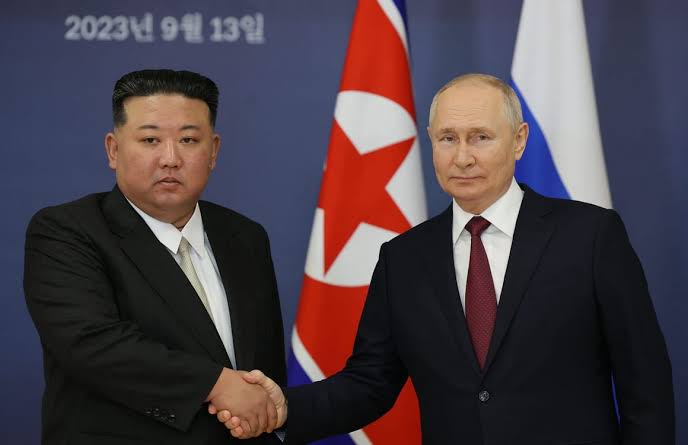The summit between Russian President Vladimir Putin and North Korean leader Kim Jong-un, held on a historic backdrop of international tension, displayed a warm and cordial atmosphere. Yet, the details of their discussions concerning military cooperation remained shrouded in uncertainty. This meeting held significant implications not only for the two nations involved but also for regional stability in the Asian continent.
Historically, Russia’s isolation from the Western world, particularly due to its involvement in the Ukraine war, and North Korea’s long-standing isolation stemming from its nuclear and missile programs, had left both nations seeking avenues for diplomatic maneuvering. Against this backdrop, the growing closeness between the top leaders of these two countries was a matter of increasing concern and intrigue.
During the summit, North Korean leader Kim Jong-un extended his unwavering support to President Putin and even extended a warm invitation for Putin to visit North Korea in return, which the Russian leader graciously accepted, although the visit’s date remained undetermined. Kim Jong-un went a step further by pledging to establish enduring ties with Russia, spanning a remarkable 100 years. President Putin, in response, emphasized the rich history and traditions shared between the two nations and expressed his desire to maintain close contact between them.
The most significant aspect of their discussions revolved around strategic cooperation in the face of what they perceived as “military threats, incitement, and despotism of imperialist powers.” Although the Ukraine conflict was not explicitly named, Kim Jong-un expressed his confidence in Russia’s eventual victory against its adversaries, pledging his country’s unwavering support.
A notable event during the summit was Kim Jong-un’s visit to a Russian space launch facility with President Putin, symbolizing their shared interests in space exploration and technology. However, beyond the external display of warmth and camaraderie, details regarding increased cooperation in areas like arms supplies, arms trade, or technical assistance remained conspicuously absent from public disclosure.
This lack of transparency has raised concerns, especially considering Russia’s heightened demand for arms and ammunition due to its involvement in the Ukraine war. Both the United States and South Korea have expressed apprehension over potential arms-related collaboration between Russia and North Korea, with the US State Department spokesman Matthew Miller highlighting the possibility of such cooperation violating UN Security Council resolutions.
Japan has echoed these concerns, warning of the potential consequences of such collaboration. Furthermore, speculation has arisen regarding the existence of secret military understandings between the two nations, fueled by the conspicuous presence of North Korea’s top military leadership during Kim Jong-un’s visit to Russia.
The overarching fear is that closer military cooperation between Russia and North Korea, particularly when considering China’s alignment with Russia, could destabilize the Asian continent and threaten regional stability. President Putin’s pledge to assist North Korea in building satellites has further fueled concerns, as it may enhance North Korea’s military capabilities and alter the regional power dynamics.
In summary, the Putin-Kim summit, held against the backdrop of international isolation and geopolitical tension, left many questions unanswered regarding the extent and nature of their military cooperation. This uncertainty has raised concerns among international observers and underscored the need for continued vigilance in monitoring developments in the region.



 For all latest articles, follow on Google News
For all latest articles, follow on Google News